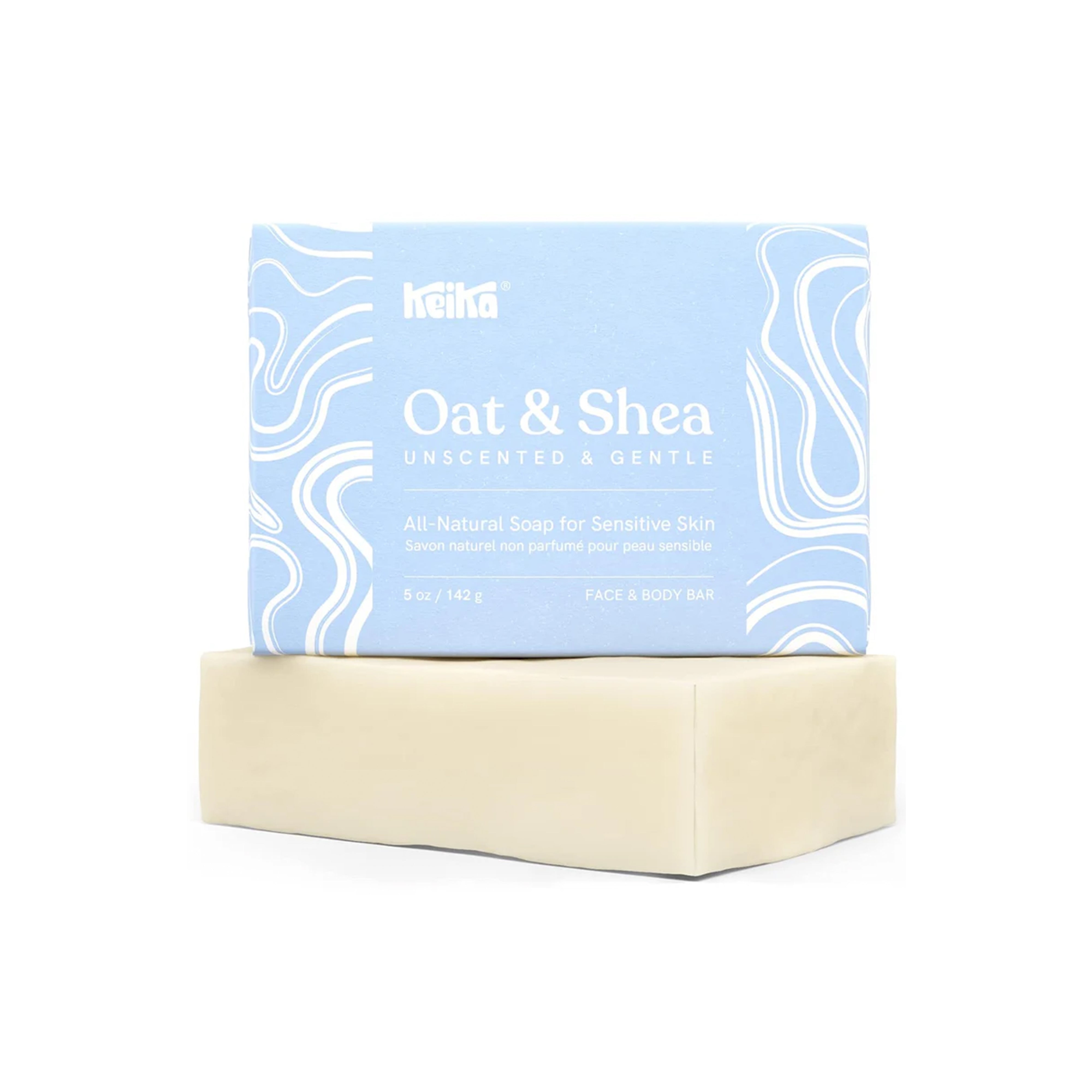
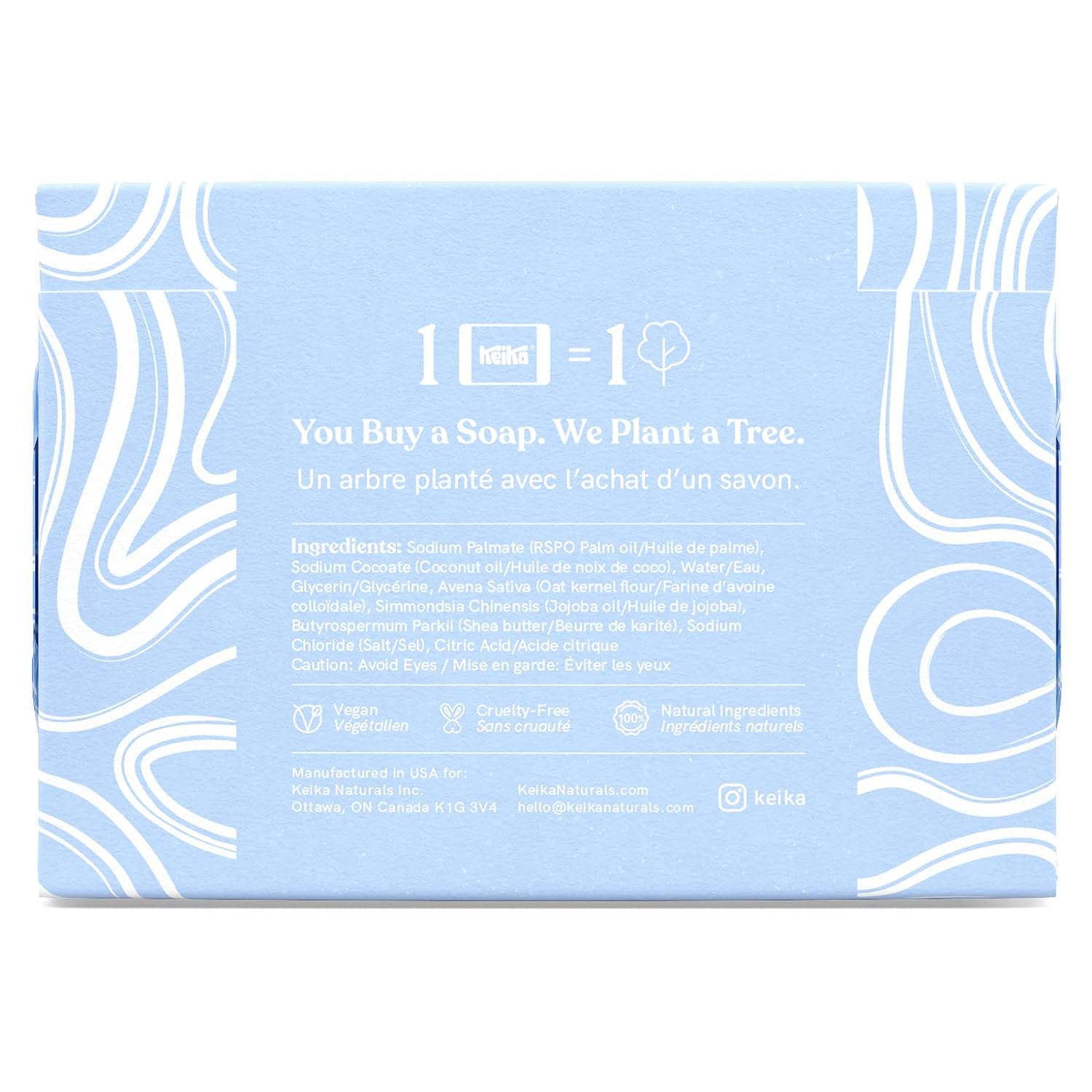

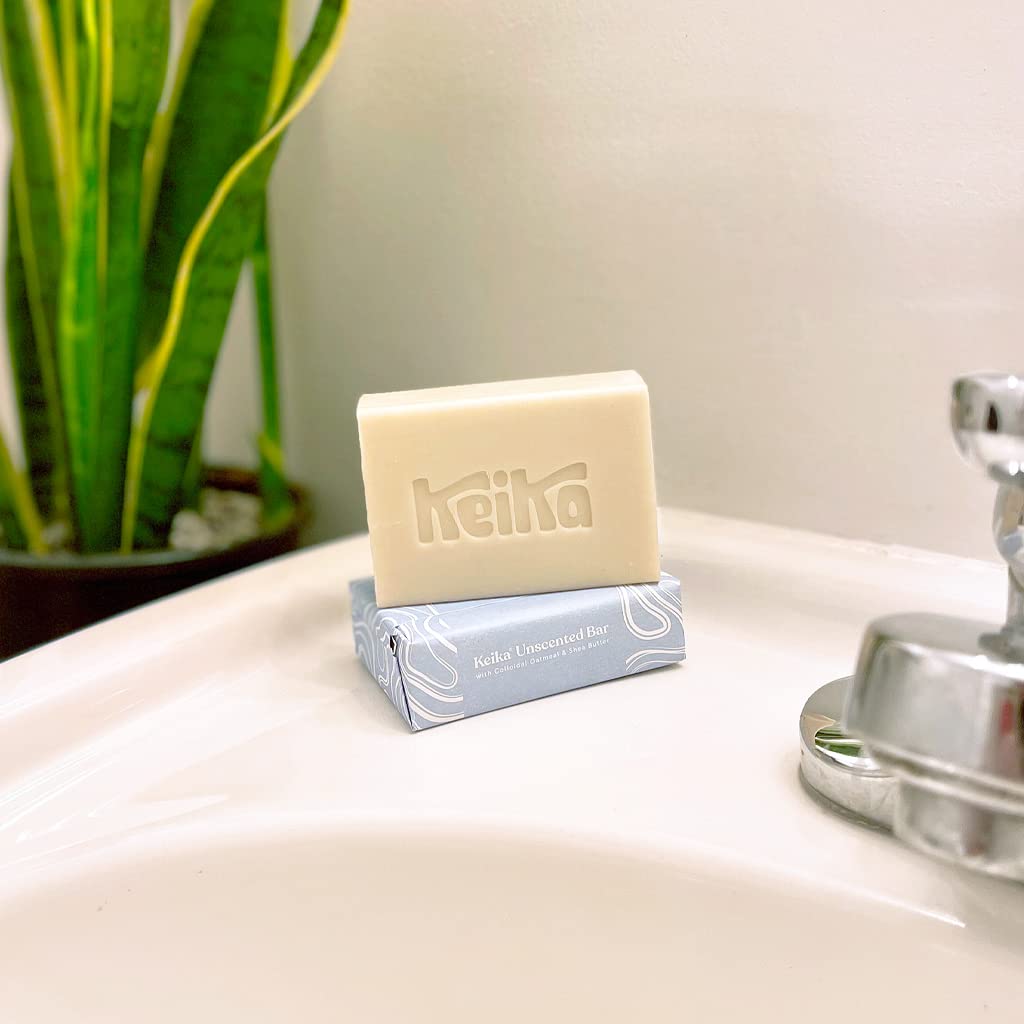
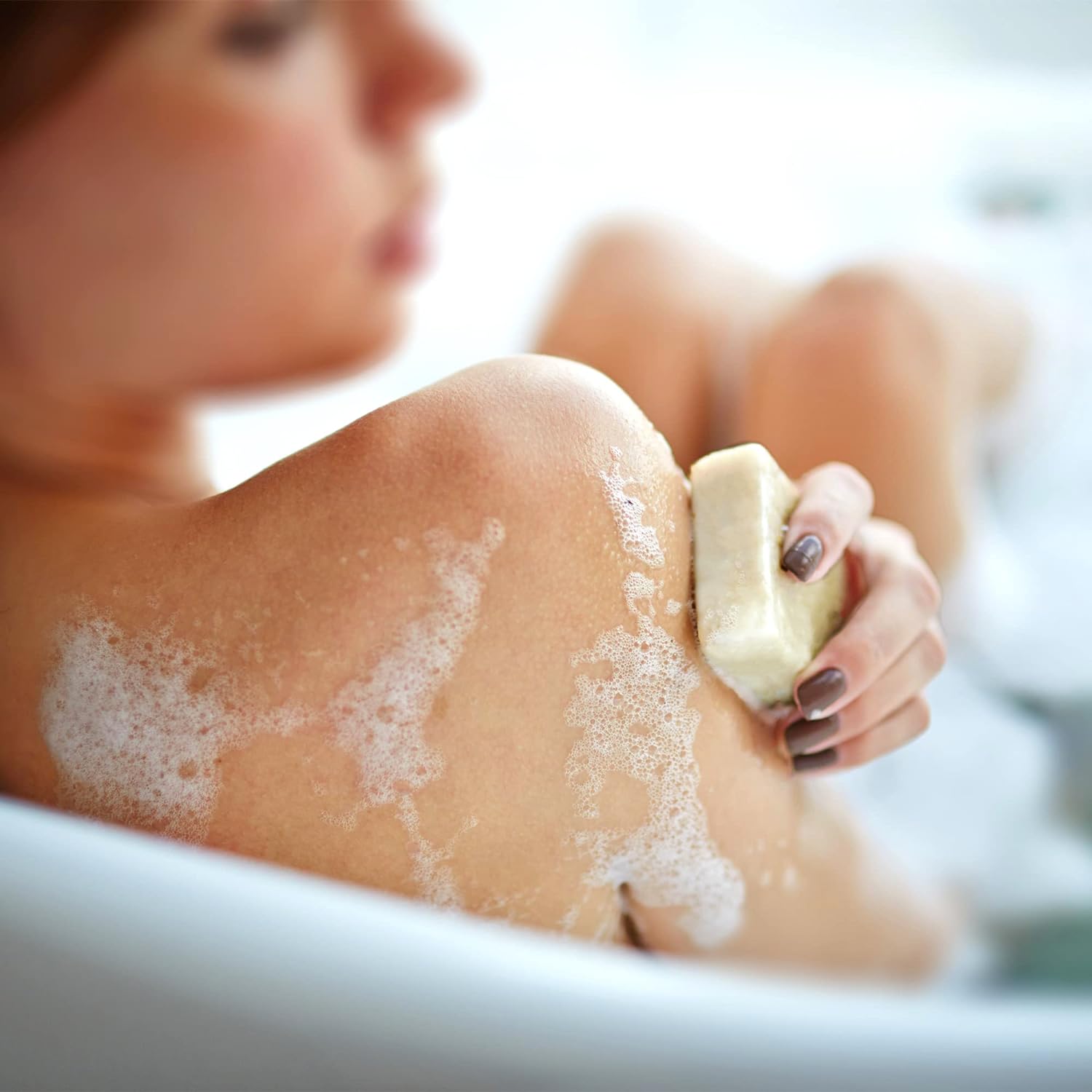
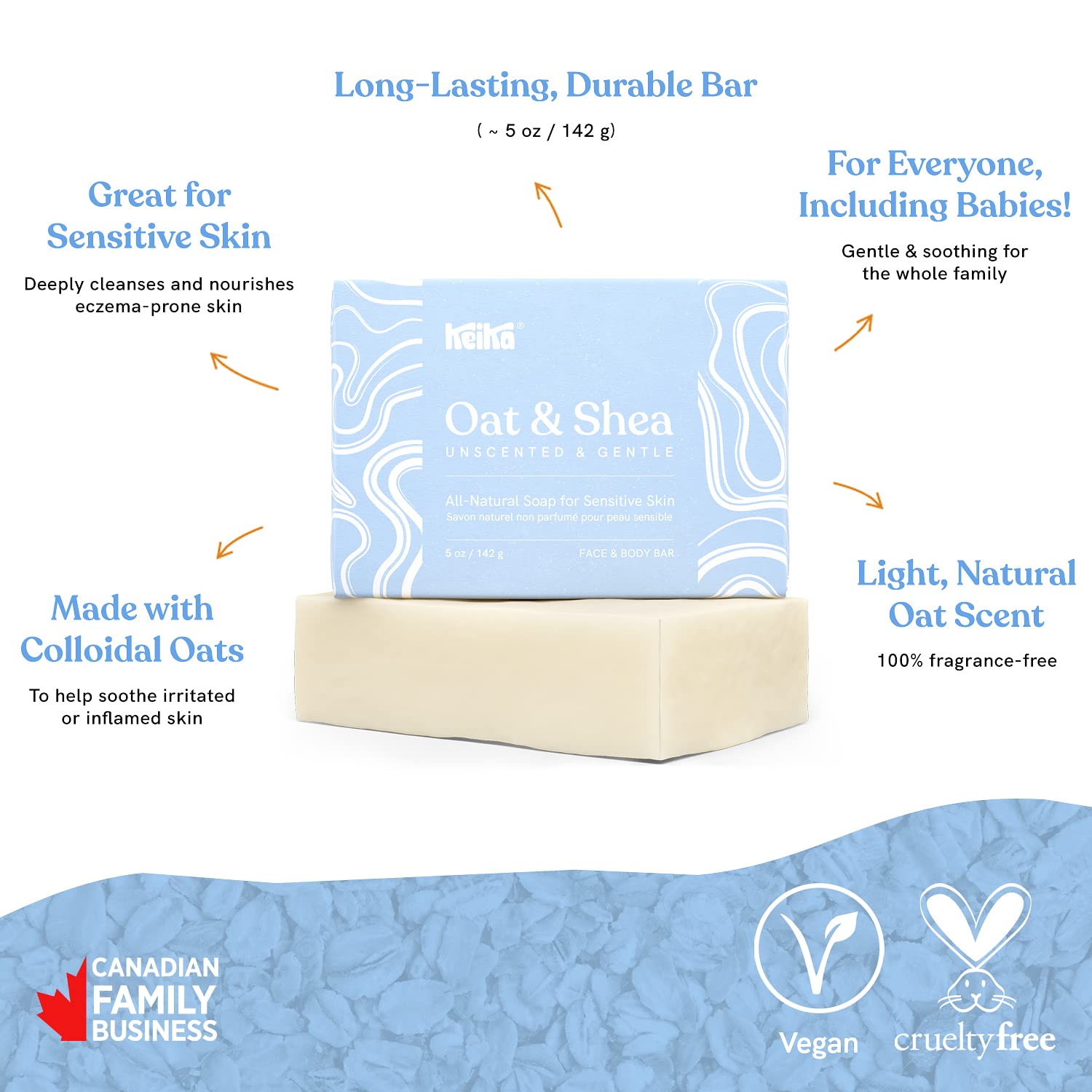
Keika Baby Bar Soap - Gentle Relief for Eczema & Sensitive Skin - Unscented, 5 oz


Citric Acid
Medium RiskCitric acid is an alpha hydroxy acid used in personal care products primarily for its role as a pH adjuster and natural preservative. It occurs naturally in citrus fruits and is commonly utilized in various formulations for its chelating properties and mild exfoliation benefits.
Sustai Insights
Citric acid offers functional benefits as an effective preservative and pH stabilizer, contributing to product longevity and stability. It is biodegradable and derived from renewable sources. Health risks are low, with minimal concerns regarding carcinogenicity, allergies, and reproductive toxicity. However, moderate use restrictions exist due to potential irritation at high concentrations. Environmental risks are limited, as citric acid is not known to accumulate in ecosystems. Regulatory agencies have no significant advisories against its use. Overall, it is assessed as a medium-risk ingredient, with safe usage practices recommended and alternatives available.
Sodium Palmate
Low RiskSodium palmate is the sodium salt of fatty acids derived from palm oil, commonly used as a surfactant and emulsifier in cosmetic formulations. It helps to create lather and improve the texture of products, making it a popular ingredient in soaps and cleansers.
Sustai Insights
Sodium palmate offers functional benefits such as effective cleansing and emulsifying properties, contributing to product stability. It is considered low risk for health concerns, including carcinogenicity and allergenic potential, and has no significant environmental hazards. Regulatory bodies have not imposed restrictions on its use. Safe usage involves adhering to established concentrations, with no major alternatives highlighted. Overall, sodium palmate presents a low risk profile.
Avena Sativa (Oat)
Low RiskAvena sativa, commonly known as oat, is a cereal grain that is widely used for its nutritional benefits and functional properties in various products. It is often included for its calming and moisturizing effects on the skin, making it a popular ingredient in personal care formulations.
Sustai Insights
Avena sativa offers functional benefits, including skin soothing and moisturizing properties, contributing to enhanced product efficacy. It is sustainably sourced and biodegradable. Health risks are low, with minimal concerns regarding carcinogenicity, allergenic potential, or reproductive toxicity. Environmental impacts are also low, with no significant pollutant potential or bioaccumulation. Regulatory assessments indicate no restrictions or advisories. Overall, it is considered a low-risk ingredient, suitable for various applications.
Sodium Cocoate
Low RiskSodium cocoate is the sodium salt of fatty acids derived from coconut oil. It is primarily used in cosmetic formulations as a surfactant and cleansing agent, effectively helping to emulsify oils and fats, contributing to the overall texture and performance of the product.
Sustai Insights
Sodium cocoate acts as an effective surfactant and cleansing agent, offering functional benefits in personal care products. It is biodegradable and derived from renewable sources, contributing to sustainability. Health risks are low, as it is not associated with carcinogenicity, significant allergenic potential, or reproductive toxicity. However, it may cause mild irritation to skin, eyes, or lungs. Regulatory bodies have not imposed significant restrictions, affirming its safety for use. Overall, it presents a low-risk profile, making it a suitable choice in formulations.
Avena Sativa (Oat) Kernel Flour
Low RiskAvena sativa (oat) kernel flour is a powder obtained from grinding the kernels of the oat plant. It is commonly used in cosmetic formulations for its mild exfoliating properties and ability to enhance the texture of products.
Sustai Insights
Avena sativa (oat) kernel flour provides functional benefits such as skin soothing and moisturizing due to its natural composition. It is considered to have low health risks, including low potential for carcinogenicity, allergies, and reproductive toxicity. Environmentally, it poses minimal pollution risks and is not bioaccumulative. Regulatory bodies have not imposed significant restrictions, indicating a favorable safety profile. Overall, the ingredient is assessed as low risk. Safe usage practices include avoiding excessive exposure, and alternatives may include other natural exfoliants like rice powder.
Water
Low RiskWater is a clear, colorless liquid essential for various biological processes. It serves as a solvent in formulations, facilitating the dissolution of other ingredients and enhancing product texture and application. Additionally, water plays a crucial role in hydration and is a key component in many cosmetic and personal care products.
Sustai Insights
Water is an effective solvent and hydrator, contributing to the texture and efficacy of formulations. It is biodegradable and generally regarded as safe, with low concerns regarding carcinogenicity, allergies, and reproductive toxicity. However, excessive water usage can lead to environmental concerns, particularly regarding resource depletion. Regulatory bodies do not impose restrictions on water use in cosmetics. Overall, the risks associated with water are low, making it a safe and essential ingredient.
Cocos Nucifera (Coconut) Oil
Low RiskCocos Nucifera (Coconut) Oil is derived from the kernels of the coconut palm. It is primarily used in cosmetic formulations for its emollient and moisturizing properties, making it suitable for skin and hair care products.
Sustai Insights
Coconut oil serves as an effective moisturizer and emollient, promoting skin hydration and softness. It is sustainably sourced and biodegradable. Health risks are minimal, with low concerns regarding carcinogenicity, allergens, and reproductive toxicity. Environmental impact is also low, as it does not contribute significantly to pollution or bioaccumulation. Regulatory bodies have not issued restrictions on its use. Overall, coconut oil presents a low risk for health and environmental concerns, making it a safe ingredient in cosmetic products.
Sea Salt
Low RiskSea salt is a mixture of inorganic salts derived primarily from the evaporation of seawater. It consists mainly of sodium chloride, with minor amounts of other minerals. Sea salt is commonly used as a seasoning and preservative in food products and may also have applications in cosmetics and personal care items.
Sustai Insights
Sea salt serves as an effective flavor enhancer and preservative, contributing to the taste and shelf-life of food products. It is generally considered safe with low risk for health concerns such as cancer, allergies, and reproductive toxicity. Environmental impact is minimal, as it does not contribute significantly to pollution or bioaccumulation. Regulatory bodies, including the FDA, currently do not impose restrictions on its use. Overall, the risk level associated with sea salt is low, making it a widely accepted ingredient with no significant adverse effects reported.
Simmondsia Chinensis (Jojoba)
Low RiskSimmondsia chinensis, commonly known as jojoba, is an oil derived from the seeds of the jojoba plant. It is commonly used in cosmetic formulations for its moisturizing properties, acting as an emollient and skin conditioning agent.
Sustai Insights
Jojoba oil offers functional benefits such as effective skin moisturization and is biodegradable, with sustainable sourcing practices. Health risks are low, with minimal concerns regarding carcinogenicity, allergies, and reproductive toxicity. Environmental impact is negligible, with no pollutant or bioaccumulation potential. Regulatory status is favorable with no significant restrictions noted. Overall, it is assessed as low risk, and safe usage practices should be maintained. Alternatives include other plant-derived oils like argan or almond oil, which may provide similar benefits.
Vegetarian Glycerin
Low RiskVegetarian glycerin, also known as glycerol, is a colorless, odorless, and viscous liquid derived from plant sources. It is primarily used as a humectant, solvent, and emollient in various personal care products, helping to retain moisture and improve texture.
Sustai Insights
Vegetarian glycerin offers functional benefits as an effective humectant, promoting hydration and skin smoothness. It is biodegradable and typically sustainably sourced. Health risks associated with glycerin are low, with no significant concerns for carcinogenicity, allergens, or reproductive toxicity. Environmental risks are minimal, and it is not subject to major regulatory warnings. Overall, the risk level for this ingredient is low, making it a safe choice in formulations. Safe usage practices include ensuring proper concentrations in products, and alternatives such as propylene glycol exist but may have differing properties.
Butyrospermum Parkii (Shea) Butter
Low RiskButyrospermum parkii (shea) butter is a vegetable fat derived from the nuts of the shea tree. It is commonly used in cosmetic formulations for its emollient properties, providing moisture and improving skin texture. Additionally, shea butter is known for its ability to enhance the stability of products and deliver a creamy texture.
Sustai Insights
Shea butter offers functional benefits as an effective moisturizer, enhancing skin barrier function and texture. It is sustainably sourced and biodegradable, contributing to eco-friendliness. Health-wise, it is associated with low risks for carcinogenicity, allergies, and reproductive toxicity. Environmental impacts are minimal, with no significant pollutant potential identified. Regulatory assessments indicate no current restrictions. Overall, the ingredient presents a low risk, making it a favorable choice in cosmetic formulations.
Sodium Palmate
Low RiskSodium palmate is the sodium salt of fatty acids derived from palm oil, commonly used as a surfactant and emulsifier in cosmetic formulations. It helps to create lather and improve the texture of products, making it a popular ingredient in soaps and cleansers.
Sustai Insights
Sodium palmate offers functional benefits such as effective cleansing and emulsifying properties, contributing to product stability. It is considered low risk for health concerns, including carcinogenicity and allergenic potential, and has no significant environmental hazards. Regulatory bodies have not imposed restrictions on its use. Safe usage involves adhering to established concentrations, with no major alternatives highlighted. Overall, sodium palmate presents a low risk profile.
Avena Sativa (Oat)
Low RiskAvena sativa, commonly known as oat, is a cereal grain that is widely used for its nutritional benefits and functional properties in various products. It is often included for its calming and moisturizing effects on the skin, making it a popular ingredient in personal care formulations.
Sustai Insights
Avena sativa offers functional benefits, including skin soothing and moisturizing properties, contributing to enhanced product efficacy. It is sustainably sourced and biodegradable. Health risks are low, with minimal concerns regarding carcinogenicity, allergenic potential, or reproductive toxicity. Environmental impacts are also low, with no significant pollutant potential or bioaccumulation. Regulatory assessments indicate no restrictions or advisories. Overall, it is considered a low-risk ingredient, suitable for various applications.
Sodium Cocoate
Low RiskSodium cocoate is the sodium salt of fatty acids derived from coconut oil. It is primarily used in cosmetic formulations as a surfactant and cleansing agent, effectively helping to emulsify oils and fats, contributing to the overall texture and performance of the product.
Sustai Insights
Sodium cocoate acts as an effective surfactant and cleansing agent, offering functional benefits in personal care products. It is biodegradable and derived from renewable sources, contributing to sustainability. Health risks are low, as it is not associated with carcinogenicity, significant allergenic potential, or reproductive toxicity. However, it may cause mild irritation to skin, eyes, or lungs. Regulatory bodies have not imposed significant restrictions, affirming its safety for use. Overall, it presents a low-risk profile, making it a suitable choice in formulations.
Avena Sativa (Oat) Kernel Flour
Low RiskAvena sativa (oat) kernel flour is a powder obtained from grinding the kernels of the oat plant. It is commonly used in cosmetic formulations for its mild exfoliating properties and ability to enhance the texture of products.
Sustai Insights
Avena sativa (oat) kernel flour provides functional benefits such as skin soothing and moisturizing due to its natural composition. It is considered to have low health risks, including low potential for carcinogenicity, allergies, and reproductive toxicity. Environmentally, it poses minimal pollution risks and is not bioaccumulative. Regulatory bodies have not imposed significant restrictions, indicating a favorable safety profile. Overall, the ingredient is assessed as low risk. Safe usage practices include avoiding excessive exposure, and alternatives may include other natural exfoliants like rice powder.
Citric Acid
Medium RiskCitric acid is an alpha hydroxy acid used in personal care products primarily for its role as a pH adjuster and natural preservative. It occurs naturally in citrus fruits and is commonly utilized in various formulations for its chelating properties and mild exfoliation benefits.
Sustai Insights
Citric acid offers functional benefits as an effective preservative and pH stabilizer, contributing to product longevity and stability. It is biodegradable and derived from renewable sources. Health risks are low, with minimal concerns regarding carcinogenicity, allergies, and reproductive toxicity. However, moderate use restrictions exist due to potential irritation at high concentrations. Environmental risks are limited, as citric acid is not known to accumulate in ecosystems. Regulatory agencies have no significant advisories against its use. Overall, it is assessed as a medium-risk ingredient, with safe usage practices recommended and alternatives available.
Water
Low RiskWater is a clear, colorless liquid essential for various biological processes. It serves as a solvent in formulations, facilitating the dissolution of other ingredients and enhancing product texture and application. Additionally, water plays a crucial role in hydration and is a key component in many cosmetic and personal care products.
Sustai Insights
Water is an effective solvent and hydrator, contributing to the texture and efficacy of formulations. It is biodegradable and generally regarded as safe, with low concerns regarding carcinogenicity, allergies, and reproductive toxicity. However, excessive water usage can lead to environmental concerns, particularly regarding resource depletion. Regulatory bodies do not impose restrictions on water use in cosmetics. Overall, the risks associated with water are low, making it a safe and essential ingredient.
Cocos Nucifera (Coconut) Oil
Low RiskCocos Nucifera (Coconut) Oil is derived from the kernels of the coconut palm. It is primarily used in cosmetic formulations for its emollient and moisturizing properties, making it suitable for skin and hair care products.
Sustai Insights
Coconut oil serves as an effective moisturizer and emollient, promoting skin hydration and softness. It is sustainably sourced and biodegradable. Health risks are minimal, with low concerns regarding carcinogenicity, allergens, and reproductive toxicity. Environmental impact is also low, as it does not contribute significantly to pollution or bioaccumulation. Regulatory bodies have not issued restrictions on its use. Overall, coconut oil presents a low risk for health and environmental concerns, making it a safe ingredient in cosmetic products.
Sea Salt
Low RiskSea salt is a mixture of inorganic salts derived primarily from the evaporation of seawater. It consists mainly of sodium chloride, with minor amounts of other minerals. Sea salt is commonly used as a seasoning and preservative in food products and may also have applications in cosmetics and personal care items.
Sustai Insights
Sea salt serves as an effective flavor enhancer and preservative, contributing to the taste and shelf-life of food products. It is generally considered safe with low risk for health concerns such as cancer, allergies, and reproductive toxicity. Environmental impact is minimal, as it does not contribute significantly to pollution or bioaccumulation. Regulatory bodies, including the FDA, currently do not impose restrictions on its use. Overall, the risk level associated with sea salt is low, making it a widely accepted ingredient with no significant adverse effects reported.
Simmondsia Chinensis (Jojoba)
Low RiskSimmondsia chinensis, commonly known as jojoba, is an oil derived from the seeds of the jojoba plant. It is commonly used in cosmetic formulations for its moisturizing properties, acting as an emollient and skin conditioning agent.
Sustai Insights
Jojoba oil offers functional benefits such as effective skin moisturization and is biodegradable, with sustainable sourcing practices. Health risks are low, with minimal concerns regarding carcinogenicity, allergies, and reproductive toxicity. Environmental impact is negligible, with no pollutant or bioaccumulation potential. Regulatory status is favorable with no significant restrictions noted. Overall, it is assessed as low risk, and safe usage practices should be maintained. Alternatives include other plant-derived oils like argan or almond oil, which may provide similar benefits.
Vegetarian Glycerin
Low RiskVegetarian glycerin, also known as glycerol, is a colorless, odorless, and viscous liquid derived from plant sources. It is primarily used as a humectant, solvent, and emollient in various personal care products, helping to retain moisture and improve texture.
Sustai Insights
Vegetarian glycerin offers functional benefits as an effective humectant, promoting hydration and skin smoothness. It is biodegradable and typically sustainably sourced. Health risks associated with glycerin are low, with no significant concerns for carcinogenicity, allergens, or reproductive toxicity. Environmental risks are minimal, and it is not subject to major regulatory warnings. Overall, the risk level for this ingredient is low, making it a safe choice in formulations. Safe usage practices include ensuring proper concentrations in products, and alternatives such as propylene glycol exist but may have differing properties.
Butyrospermum Parkii (Shea) Butter
Low RiskButyrospermum parkii (shea) butter is a vegetable fat derived from the nuts of the shea tree. It is commonly used in cosmetic formulations for its emollient properties, providing moisture and improving skin texture. Additionally, shea butter is known for its ability to enhance the stability of products and deliver a creamy texture.
Sustai Insights
Shea butter offers functional benefits as an effective moisturizer, enhancing skin barrier function and texture. It is sustainably sourced and biodegradable, contributing to eco-friendliness. Health-wise, it is associated with low risks for carcinogenicity, allergies, and reproductive toxicity. Environmental impacts are minimal, with no significant pollutant potential identified. Regulatory assessments indicate no current restrictions. Overall, the ingredient presents a low risk, making it a favorable choice in cosmetic formulations.
Discover the gentle touch of Keika Baby Soap Bar, crafted with care for sensitive skin. This unscented soap, enriched with oat and shea butter, soothes and cleanses both infants and adults, making it perfect for eczema and psoriasis relief.
- Gentle Cleansing: Formulated with natural ingredients, it effectively cleanses without stripping moisture, ideal for delicate skin.
- Soothing Properties: Oat kernel flour and shea butter work together to calm irritation and provide hydration, perfect for those with sensitive skin.
- Versatile Use: Suitable for face and body, this soap bar is great for all ages, from infants to adults, ensuring everyone stays clean and comfortable.
- Eco-Friendly Ingredients: Made with RSPO-certified palm oil and other sustainable components, this soap prioritizes both skin health and the environment.
- Safety Assured: Free from harsh chemicals and synthetic fragrances, this product is designed to be safe for everyday use while avoiding eye contact.
Subscribe & Save with Sustai
- Best Price Guarantee: Always enjoy the lowest prices on sustainable home essentials.
- No Surprises: We’ll notify you before shipping. No hidden fees, ever.
- You’re in Charge: Change, pause, or cancel your subscription anytime with ease.
- Eco-Friendly Deliveries: Our grouped shipments mean less packaging and lower emissions.
Join us on a sustainable journey. Special offers for a limited time! Prices and promotions may change.
Recommended Products
Discover the gentle touch of Keika Baby Soap Bar, crafted with care for sensitive skin. This unscented soap, enriched with oat and shea butter, soothes and cleanses both infants and adults, making it perfect for eczema and psoriasis relief.
- Gentle Cleansing: Formulated with natural ingredients, it effectively cleanses without stripping moisture, ideal for delicate skin.
- Soothing Properties: Oat kernel flour and shea butter work together to calm irritation and provide hydration, perfect for those with sensitive skin.
- Versatile Use: Suitable for face and body, this soap bar is great for all ages, from infants to adults, ensuring everyone stays clean and comfortable.
- Eco-Friendly Ingredients: Made with RSPO-certified palm oil and other sustainable components, this soap prioritizes both skin health and the environment.
- Safety Assured: Free from harsh chemicals and synthetic fragrances, this product is designed to be safe for everyday use while avoiding eye contact.

You can have at most 2 Sustainable Steals products in your cart
Customer Reviews
Customers’ View
Customers appreciate the gentle and effective nature of the Baby Soap Bar with Oat & Shea, especially for sensitive skin conditions like eczema and psoriasis. Many users report that it leaves their skin feeling clean, moisturized, and soft without any tightness. The soap's natural ingredients, including soothing oatmeal and hydrating shea butter, resonate well with health-conscious consumers. Additionally, the mild scent is praised for being non-overpowering, making it suitable for those with scent sensitivities. While some customers mention the price as a consideration, the overall sentiment reflects satisfaction with its performance and quality. Overall, this product aligns with the values of environmentally and health-conscious buyers, providing a nurturing option for the whole family.
AI-generated from the text of customer reviewsThis product is rated 4.6 of 5.0 stars.
It has received 7 reviews.




